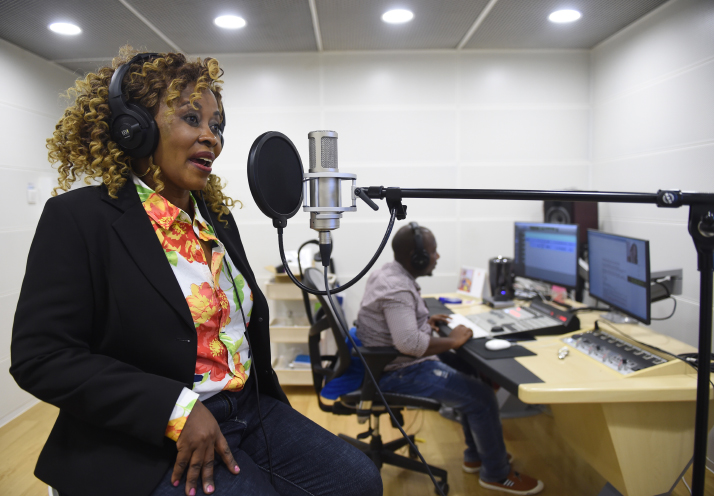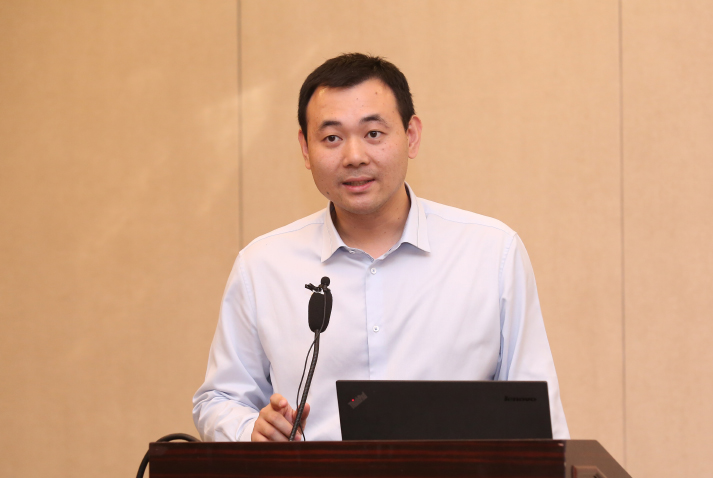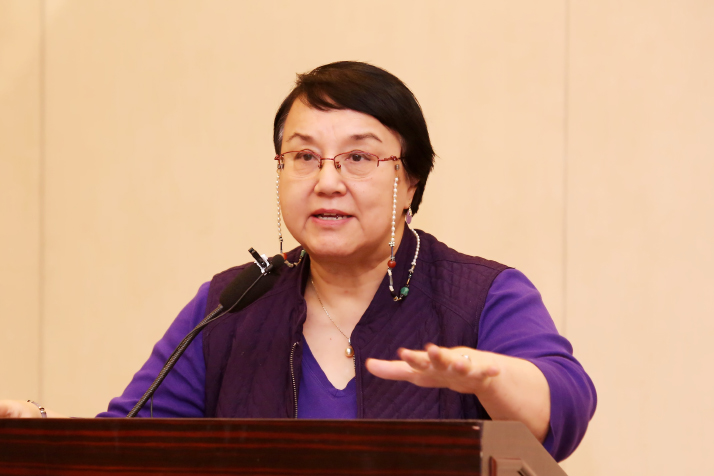| Lifestyle |
| A Global Audience | |
| The selection, translation and dubbing of Chinese films and TV programs need additional work to expand to foreign markets | |
|
|
 An actor from Tanzania dubs a Chinese TV drama at StarTimes Ltd., a Chinese digital TV service provider in Beijing, on August 14 (XINHUA)
In recent years, an increasing number of Chinese films and TV shows have been released in the overseas market. This summer, a Chinese historical TV drama The Story of Yanxi Palace produced by Huanyu Entertainment was released in over 70 countries and regions and proved a hit among foreign audiences. The show was even trending on foreign social media networks. Zhu Xinmei, Deputy Director of the International Department of the Development and Research Center of the National Radio and Television Administration, said China has launched a series of government-funded projects to translate Chinese TV programs and films into foreign languages. Under the China-Africa TV and film cooperation project, over 150 Chinese TV and film works have been translated into seven languages including English, French, Swahili, Hausa and Arabic between 2012 and 2017. Localization The Beijing Chinese-Foreign Translation and Information Service, a translation company in Beijing, has held a series of activities to promote Chinese TV productions abroad. It promoted the first season of the Chinese documentary A Bite of China in Thailand and was responsible for translation, dubbing, and distribution. The series was screened at a food festival in Bangkok. Gu Jufan, General Manager of the company said the food festival had enabled the local audience to not only see but also smell and taste Chinese delicacies, which helped boost the documentary's popularity among locals. The seven-episode documentary was shown on Digital New TV 18 in Thailand in March.  Gu Jufan, General Manager of the Beijing Chinese-Foreign Translation and Information Service, speaks at a forum held as part of the annual meeting of the Translators Association of China on November 20 (COURTESY PHOTO)
The translation and global dissemination of domestic TV and film productions was a topic of discussion at a forum held at the annual meeting of the Translators Association of China on November 20. Shen Jianing, Assistant General Manager of China International Television Corp. (CITVC), suggested that localization is a paramount strategy in cross-cultural communications. Shen said although China has become the largest producer of TV dramas in the world, few productions are made exclusively for the international market. "We should increase production of TV programs and films targeting international audiences," said Shen. When shown abroad, the length of TV programs and dramas should be adjusted to meet the expectations of foreign audiences. In China, a TV drama normally totals 40 episodes while in Europe and North America TV dramas average around 12 episodes a season. Shen's company shortened the 50-episode TV drama The Legend of Bruce Lee into 30 episodes for the English speaking market. CITVC sells over 20,000 hours of TV, documentaries, animations and variety shows every year to more than 150 countries and regions. Since 2015, the company has cooperated with overseas media to open China Hour on TV channels in eight countries including South Africa, United Arab Emirates, the UK, Nepal, Serbia, Myanmar, Portugal and Sierra Leone and establish the Chinese channel in countries such as Indonesia and Cambodia.  Lynette Shi, an associate professor at the Middlebury Institute of International Studies at Monterey, California, speaks at a forum held as part of the annual meeting of the Translators Association of China on November 20 (COURTESY PHOTO)
Song Jianing, Director of the French arm of China Global Television Network (CGTN), said caution needs to be taken when selecting film and TV productions to be shown abroad. Costume dramas without proper context should be avoided as foreigners may not be able to properly place the action within the vast expanse of Chinese history. The CGTN French Channel has a TV drama section which shows 90 minutes of a Chinese TV series either dubbed in French or with French subtitles. Since the establishment of the channel in 2007, it has broadcasted nearly 200 Chinese TV dramas such as 2018's Mr. Right. "We should choose dramas that reflect Chinese culture which have already been a success in the domestic market, especially those about contemporary urban life in China," said Song. Improving understanding Lynette Shi, an associate professor at the Middlebury Institute of International Studies at Monterey, California, said TV and film productions are the best way for foreign audiences to learn about modern China. But the types of productions chosen to be translated into foreign languages are important. Shi said she has lived abroad for long years and feels that there are many misunderstandings or even prejudices toward China. Some foreigners think the Chinese are mysterious, with others projecting several stereotypes onto them. "Through TV programs and films, we should enable foreigners to realize that 'Chinese are just like us'," said Shi. "Only when foreigners feel Chinese are the same as them will they develop an interest in the country and want to know more about Chinese history and customs," Shi added. Shi was invited to join a team of experts to evaluate over 100 productions that were set to be exported overseas by the Academy of Contemporary China and World, a think tank specializing in international communication studies, last year. She was responsible for 15 of them.  A poster of Mr. Right (FILE)
Experts at the forum also pointed out problems with regards to translating subtitles. Shen, who has been a Chinese-French translator, said subtitle translation differs from other forms. Translators don't need to translate everything because the images and music can convey much of the information. Whether to dub a production or show it with foreign subtitles is also a topic of discussion. Shi suggested using subtitles without dubbing. Mo Zhiwei, Deputy Director of a department responsible for translating and dubbing TV productions at China Radio International, said that Chinese TV dramas are facing competition from their American and British counterparts in the international market. Content is the key for them to survive. Copyedited by Craig Crowther Comments to jijing@bjreview.com |
|
||||||||||||||||||||||||||||
|